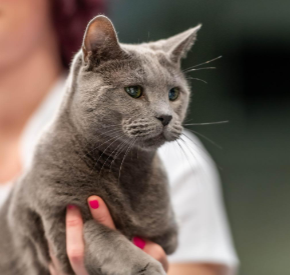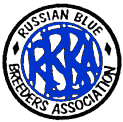|
Welcome to the official web site of the Russian Blue
Breeders' Association.
The RBBA is affiliated to both
the "Governing Council of the Cat Fancy",
the organisation which oversees similar clubs and associations in Great
Britain, and International
Cat Care (formerly the Feline Advisory Bureau), a charity which promotes
the health and welfare of cats.
If you are interested in buying a kitten (in the UK)
the information you need is in the Breeder's list
& Kitten Notes. Of course, kittens aren't always
available.
We don't have any information about
American breeders, but there are a number of sites in links
section which should be able to help you.
Note the Welfare
link. The RBBA, through its Welfare Officer, organises a rehoming
service for homeless Russian Blues. You may feel that instead of a kitten
you would like to adopt an older cat. If this is the case this page will
tell you how to go about it. I'm afraid this service is restricted to
the UK due to quarantine regulations.
|




